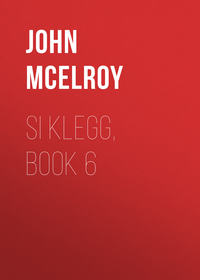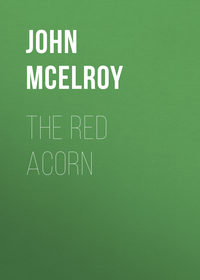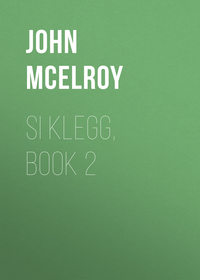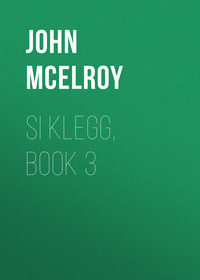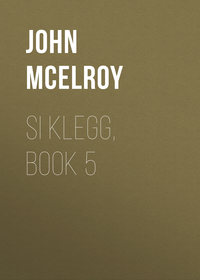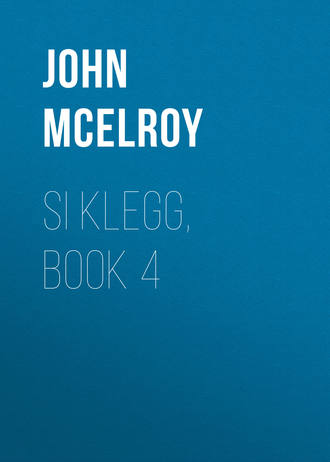 полная версия
полная версияSi Klegg, Book 4
Then the great problem became one of proper food for the boys. Daily the rations were growing shorter in Chattanooga, and if they had been plentiful they were not suited to the delicate stomachs of those seriously ill. Si was slowly improving, but the Deacon felt that the thing necessary to carry him over the breakers and land him safely on the shores of recovery was nourishing food that he could relish.
He had anxiously sought the entire length of the camp for something of that kind. He had visited all the sutlers, and canvassed the scanty stocks in the few stores in Chattanooga. He had bought the sole remaining can of tomatoes at a price which would have almost bought the field in which the tomatoes were raised, and he had turned over the remnant lots of herring, cheese, etc., he found at the sutler's, with despair at imagining any sort of way in which they could be worked up to become appetizing and assimilative to Si's stomach.
"What you and Si needs," he would say to Shorty, "is chicken and fresh 'taters. If you could have a good mess of chicken and 'taters every day you'd come up like Spring shoats. I declare I'd give that crick bottom medder o' mine, which hasn't it's beat on the Wabash, to have mother's coopful o' chickens here this minute."
But a chicken was no more to be had in Chattanooga than a Delmonico banquet. The table of the Major-General commanding the Army of the Cumberland might have a little more hardtack and pork on it than appeared in the tents of the privates, and be cooked a little better, but it had nothing but hardtack and pork.
The Deacon made excursions into the country, and even ran great risks from the rebel pickets and bushwhackers, in search of chickens. But the country had been stripped, by one side or the other, of everything eatable, and the people that remained in their cheerless homes were dependent upon what they could get from the United States Commissary.
One day he found the Herd-Boss in camp, and poured forth his troubles to him. The Herd-Boss sympathized deeply with him, and cudgeled his brains for a way to help.
"I'll tell you what you might do," he said at length, "if you care to take the risk. We're goin' back with some teams to Bridgeport to-morrow mornin'. You might git in one of the wagons and ride back 10 or 15 miles to a little valley that I remember that's there, and which I think looks like it hain't bin foraged. I was thinkin' as we come through the other day that I might git something goo'd to eat up there, and I'd try it some day. No body seems to 've noticed it yit. But it may be chock full o' rebels, for all I know, and a feller git jumped the moment he sets foot in it."
"I'll take my chances," said the Deacon. "I'll go along with you to-morrer mornin'."
The Deacon found that a ride in a wagon was not such an unqualified favor as he might have thought. The poor, half-fed, overworked mules went so slowly that the Deacon could make better time walking, and he was too merciful to allow them to pull him up hill.
The result was that, with helping pry the stalled wagons out and work in making the roads more passable, the Deacon expended more labor than if he had started out to walk in the first place.
It was late in the afternoon when the Herd-Boss said:
"There, you take that path to the right, and in a little ways you'll come out by a purty good house. I hain't seen any Johnnies around in this neighborhood since I've bin travelin' this route, but you'd better keep your eye peeled, all the same. If you see any, skip back to the road here, and wait awhile. Somebody 'll be passin' before long."
Thanking him, the Deacon set out for the house, hoping to be able to reach it, get some fowls, and be back to Chattanooga before morning. If he got the chickens, he felt sanguine that he could save Si's life.
He soon came in sight of the house, the only one, apparently, for miles, and scanned it carefully. There were no men to be seen, though the house appeared to be inhabited. He took another look at the heavy revolver which he had borrowed from the Surgeon, and carried ready for use in the pocket of Si's overcoat, and began a strategic advance, keep ing well out of sight under the cover of the sumachs lining the fences.
Still he saw no one, and finally he became so bold as to leave his covert and walk straight to the front door. A dozen dogs charged at him with a wild hullabaloo, but he had anticipated this, and picked up a stout hickory switch in the road, which he wielded with his left hand with so much effect that they ran howling back under the house. He kept his right hand firmly grasping his revolver.
An old man and his wife appeared at the door; both of them shoved back their spectacles until they rested on the tops of their heads, and scanned him searchingly. The old woman had a law-book in her hand, and the old man a quill pen. She had evidently been reading to him, and he copying.
The old man called out to him imperiously:
"Heah, stranger, who air yo'? An' what d'yo' want?"
The tone was so harsh and repellant that the Deacon thought that he would disarm hostility by announcing himself a plain citizen, like themselves. So he replied:
"I'm a farmer, and a citizen from Injianny, and I want to buy some chickens for my son, who's sick in the hospital at Chattanoogy."
"Injianny!" sneered the old man. "Meanest people in the world live in Injianny. Settled by scalawags that we'uns run outen Tennessee bekase they'uns wuz too onery to live heah."
"Citizen!" echoed the woman. "They'uns heap sight wuss'n the soldjers. Teamsters, gamblers, camp-followers, thieves, that'll steal the coppers off en a dead man's eyes. I had a sister that married a man that beat her, and then run off to Injianny, leavin' her with six children to support. All the mean men go to Injianny. Cl'ar out. We don't want nobody 'round heah, and specially no Injiannians. They'uns is a pizun lot."
"Yes, cl'ar out immejitly," commanded the old man. "I'm a Jestice of the Peace, and ef you don't go to wunst I'll find a way to make yo'. We've a law agin able-bodied vagrants. Cl'ar out, now."
"Come, have a little sense," said the Deacon, not a little roiled at the abuse of his State. "I'm just as respectable a man as you dare be. I never stole anything. I've bin all my life a regler member o' the Baptist Church strict, close-communion, total-immersion Baptists. All I want o' you is to buy some o' them chickens there, and I'll give you a fair price for 'em. No use o' your flaring up over a little matter o' bizniss."
"I don't believe a word of hit," said the woman, who yet showed that she was touched by the allusion to the Baptist Church, as the Deacon had calculated, for most of the people of that section professed to be of that denomination. "What'll yo' gi' me for them chickens?"
The bargaining instinct arose in the Deacon's mind, but he repressed it. He had no time to waste. He would make an offer that at home would be considered wildly extravagant, close the business at once and get back to Chattanooga. He said: "I'll give you a dollar apiece for five."
"Humph," said the woman contemptuously. "I don't sell them for no dollar apiece. They'uns 's all we got to live on now. If I sell 'em I must git somethin' that'll go jest as fur. You kin have 'em at $5 apiece."
"Betsy," remonstrated the old man, "I'm afeard this 's wrong, and as a Magistrate I shouldn't allow hit. Hit's traffickin' with the inemy."
"No, hit hain't," she asserted. "He's not a soljer. He's a citizen, and don't belong to the army. Besides, he's a Baptist, and hit hain't so bad as ef he wuz a Presbyterian, or a shoutin' Methodist. Most of all, I'm nearly dead for some coffee, and I know whar I kin git a pound o' rayle coffee for $10."
The Deacon had been pondering. To his thrifty mind it seemed like a waste to give a crisp, new $5 bill for such an insignificant thing as a chicken. Like Indiana farmers of his period, he regarded such things as chickens, eggs, butter, etc., as "too trifling for full-grown men to bother about. They were wholly women-folks' truck." He fingered the bills in his bosom, and thought how many bushels of wheat and pounds of pork they represented. Then he thought of Si in the hospital, and how a little chicken broth would build him up. Out came five new $5 bills.
"Here's your money," he said, thumbing over the bills clumsily and regretfully.
The old woman lowered her spectacles from the top of her head, and scrutinized them.
"What's them?" she asked suspiciously.
"Why, them's greenbacks Government money the very best kind," explained the Deacon. "You can't have no better'n that."
"Don't tech hit! Don't have nothin' to do with it!" shouted the old man. "Hit's high treason to take Federal money. Law's awful severe about that. Not less'n one year, nor more'n 20 in the penitentiary, for a citizen, and death for a soljer, to be ketched dealin' in the inemy's money. I kin turn yo' right to the law. Ole man, take yo' money and cl'ar off the place immejitly. Go out and gather up yo' chickens, Betsy, and fasten 'em in the coop. Go away, sah, 'or I shell blow the horn for help."
"I wuz talkin' 'bout Confederit money," said the woman, half apologetically. "I wouldn't tech that 'ere stuff with a soap-stick. Yo'd better git away as quick as yo' kin ef yo' know what's good for yo'."
She went into the yard to gather up her flock, and the Deacon walked back into the road. When out of sight he sat down on a rock to meditate. There was not another house in sight anywhere, and it was rapidly growing dark. If he went to an other house he would probably have the same experience. He had set his heart on having those chickens, and he was a pretty stubborn man. Somehow, in spite of himself, he parted the bushes and looked through to see where the woman was housing her fowls, and noted that it was going to be very dark. Then he blushed vividly, all to himself, over the thoughts which arose.
"To think of me, a Deacon in the Baptist Church, akchelly meditatin' about goin' to another man's coop at night and stealin' his chickens? Could Maria ever be made to believe such a thing? I can't be lieve it myself."
Then he made himself think of all the other ways in which he might get chickens. They all seemed impossible. He turned again to those in the coop.
"Nothin' but measly dunhills, after all dear at a fip-and-a-bit, and yet I offered her a dollar apiece for 'em. If she'd bin a real Christian woman she'd bin glad to 've given me the chickens for as sick as man as Si is. Gracious, mother'd give every chicken on the place, if it'd help a sick person, and be glad o' the chance. They're both tough old rebels, anyhow, and their property oughtter be confiscated."
He stopped and considered the morals of the affair a little further, and somehow the idea of taking the fowls by stealth did not seem so abhorrent as at first. Then, everything was overslaughed by the thought of going into camp with the precious birds, of cleaning one and carefully stewing it, making a delicate, fragrant broth, the very smell of which would revive Si, and every spoonful bring nourishment and strength.
"Mebbe the army's demoralizin' me," he said to himself; "but I believe it's a work o' necessity and mercy, that don't stand on nice considerations. I'm goin' to have five o' them chickens, or know the reason why."
As has been before remarked, when Deacon Klegg made up his mind something had to happen. It was now quite dark. He took one of the $5 bills out of his breast pocket and put it in a pocket where it would be handy. He looked over at the house, and saw the old man and woman sitting by the fire smoking. He picked up the hickory withe to keep off the dogs, and made a circuit to reach the chicken-coop from the rear of the house. The dogs were quarreling and snarling over their supper, and paid no attention to him, until he had reached the coop, when they came at him full tilt.
The Deacon dealt the foremost ones such vicious blows that the beasts fell as if they had been cut in two, and ran howling under the house. With a quickness and skill that would have done credit to any veteran in the army, he snatched five chickens from their roosts, wrung their necks, and gathered them in his left hand. Alarmed by the noise of the barking and yelping, the old couple flung open the door and rushed out on the porch with shouts. The open door threw a long lane of bright light directly on the Deacon.
"Blow the horn, granddad blow the horn," screamed the woman. Her husband snatched the tin horn down from the wall, and put all his anger into a ringing blast. It was immediately answered by a shot from a distant hill. Still holding his game in his left hand, the Deacon pulled the $5 bill out of his pocket with his right, walked up to the porch, laid it at the woman's feet and put a stone on it.
"There's full pay for your dumbed old dunghills, you cantankerous rebel," said he, as he disappeared into the darkness. "Go into the house and pray that the Lord may soften your heart, which is harder than Pharaoh's, until you have some Christian grace."
When he reached the road he could hear the sound of hoofs galloping toward the house. He smiled grimly, but kept under the shadow of the trees until he reached the main road leading to Chattanooga, where he was lucky enough to find a train making its slow progress toward the town, and kept with it until he was within our lines.
CHAPTER XX. STEWED CHICKEN
THE DEACON'S CULINARY OPERATIONS BRING HIM LOTS OF TROUBLETHE Deacon reached the corn-crib again be fore daylight, and found Si and Shorty fast asleep. This relieved him much, for he had been disturbed with apprehensions of what might happen them while he was gone. Though he was more tired, it seemed to him, than he had ever been before in all his life, yet he nerved himself up to clean and cook one of the chickens, so as to give Si a delightful surprise when he awoke.
The Deacon had grown so wise in the army ways that his first problem was how to hide the remaining four fowls until he should need them.
"I'd simply be mobbed," he communed with him self, "if daylight should come, and show me with four chickens in my possession. The whole Army o' the Cumberland 'd jump me as one man, and I'd be lucky if I got away with my life. Mebbe even the General himself 'd send a regiment down to take the things away from me. But what kin I do with 'em? If I hang 'em up inside the corn-crib they'll spile. The weather is cold enough to keep 'em outside, but I'd need a burglar-proof safe to hold on to 'em. It's just awful that morals are so bad in the army, and that men will take things that don't belong to 'em."
He stopped short, for there arose the disturbing thought as to just how he himself had come into possession of the birds, and he murmured:
"'Tain't in me to blame 'em. What is 't the Bible says about 'Let him who is without sin cast the first stone?' Certainly I'm not the man to be heavin' dornicks just now."
Mindful of past experiences, he took the fowls in one hand, when he went down to the branch with a camp-kettle to get water. He washed his face and hands in the cold water, which revived him, and returning, built a fire and hung the kettle over it, while he carefully picked and cleaned one of the chickens for cooking. Then he plucked and cleaned the others, and burned the feathers and entrails in the fire.
"Chicken feathers 's mighty tell-tale things," he said to himself. "I once knowed a man that was finally landed in the penitentiary because he didn't look out for chicken feathers. He'd bin stealin' hosses, and was hidin' with them in the big swamp, where nobody would 've suspicioned he was, if he hadn't stole chickens from the neighborhood to live on, and left their feathers layin' around careless like, and some boys, who thought the foxes was killin' the chickens, followed up the trail and run onto him."
Then a bright idea occurred to him. He had a piece of board, which he laid on the stones that formed the foundation of one end of the crib, immediately under the flooring, and on this shelf he laid the other chickens.
"I remember that Wash Jenkins that we arrested for counterfeitin' had hid his pile o' pewter dollars in the underpinnin' of his cabin, and we'd never found any stuff to convict him, except by the merest accident. We hunted all through his cabin, below and in the loft, pulled the clapboards off, and dug up every likely place in the yard, and just about as we wuz givin' the whole thing up, somebody pulled a board out o' the underpinnin' to lay in the bed o' his wagon, and the bogus dollars run out. Wash made shoes for the State down at Jeffersonville for some years on account of that man wantin' a piece o' board for his wagon-bed."
But the astute Deacon had overlooked one thing in his calculations. The crisp morning air was filled with the pungent smell of burning feathers and flesh, and the fragrance of stewing chicken. It reached hungry men in every direction, made their mouths water and their minds wonder where it could come from.
First came a famished dog, sniffing and nosing around. His appearance filled the Deacon with alarm. Here was danger to his hidden stock that he had not thought of. He took his resolution at once. Decoying the cur near him he fastened a sinewy hand upon his neck, cut his throat with his jack-knife, and dragged the carcass some distance away from the corn-crib.
"I'll git a mattock and shovel and bury it after awhile," he murmured to himself, as he returned and washed his hands. "He's settled for good, any way. He won't be snoopin' around steal in' my chickens. I hope there hain't no more measly hounds around. Should've thought they wuz all starved out long ago. My! but that chicken does smell so nice. How Si and Shorty will enjoy it. It'll build 'em right up. I'd like awfully to take some of it myself, but they'll need every drop, poor fellows."
He got a spoon, and tested some of the broth appreciatively.
"Mother'd done much better, at home in her own kitchen, or anywhere you could've put her, than me with my clumsy ways," he continued, "but she never cooked anything that'll taste better to them boys."
A negro cook appeared, with a tin cup in his hand.
"Afo' de Lawd, Boss, is hit you dat's cookin' dat chicking? I done smelled hit more'n a miled away, and hab been huntin' foh hit all ober camp. Say, Boss, foh de Lawd's sake, jist gib me a little teenty, weenty sup in dis heah tin cup for my boss. He's an ossifer, an' is layin' in de ossifer's horsepitol ober dar. Hit'll do him a powerful sight ob good."
"Awful Sorry, my friend," said the Deacon, hardening his heart, "but I haven't a bit to spare. Hain't got as much as I need for my own son and his partner. I couldn't spare a mouthful for the General o' the army even. Let your Colonel or Major sendout men to git chickens for himself."
"My boss'll be powehful disappunted," said the negro, with his big, white eyes full of tears. "He's powehful weak, foh sartin. A leetle sup ob broth'd do him an everlastin' world ob good. He ain't no Kunnel or Majah. He's only a Cappen Cappen McGillicuddy, ob the 200th Injianny."
"Capt. McGillicuddy, o' the 200th Injianny," said the Deacon, much moved. "You Bay you're Capt. McGillicuddy's man?"
"Yes, boss."
"And he's layin' very low over in a tent there?"
"Yes, boss. Got shot in de thigh in de battle, an' den had de feber. He's de very best man in de world, and I'd do ennyt'ing to help him. He's jest starvin' to def. I can't git nuffin' dat'll lay on his stummick, and stick to his ribs. I've done ransacked de hull camp and de country clean up to Jineral Bragg's Headquartehs. De tings dat I couldn't git wuz eider chained down, or had a man wid a gun ober dem. Foh Gawd's sake, boss, jist gib me a half a cupful for him."
"There's no man in the world I'd rather help than Capt. McGillicuddy," said the Deacon. "He's bin a mighty good friend to my son. I know that Si and Shorty'd divide their last crumb with him. Look here, Sambo, if I give you a cupful o' this broth and a piece o' the meat, will you git down on your knees and swear you'll take every bit straight to him, and not take even a smidjin of it for your self?"
"De Lawd be praised and magnified foreber, but I will," said the negro, dropping on his knees and holding up his hand. "Swar me on a pile o' Bibles big as a haystack. I'd radder go to hell on my knees backward dan tech de fust drap ob dat. I's too anxious to hab Cappen McGillicuddy git well, so I is. What'd become ob dis pore niggeh if he should die? No, indeedy. Hope I'll drap dead in my tracks if I taste de least wee morssel."
"I'm goin' to trust you," said the Deacon, stirring up the savory mess, ladling out a generous cupful, adding a drumstick, and covering the cup with a piece of paper. "Now, carry it carefully. Every drop's worth its weight in gold."
The Deacon looked a little regretful at the shrinking of the contents of the kettle, made by taking out the cupful, and said:
"Mebbe I oughtn't 've done it. The boys need every spoonful. But if it'd bin themselves, I know they'd have given their Captain more'n I did. He is twice blessed that giveth, and probably they'll git more somehow on account o' what I've given away. But I mustn't give any more."
"Say, Mister," said a very feeble voice at his elbow, "can't you give me a cupful o' that? It smells so good. It smells like home. I smelled it away over there in the tent, and it seemed to me that if I could get some of it I'd certainly get well, though they all say they think there's no hope for me. I crawled out of the tent and come while the nurse was asleep and wasn't watching. They won't let me get upon my feet when they're watching me, but I fooled them this time."
As he spoke, he sank down from sheer exhaustion, but still held out his cup imploringly, while an in tense longing filled his great, blue eyes.
The Deacon looked pityingly at him. His wan face was fair and delicate as a girl's, and even be fore disease had wasted him he had been very tall and slender. Now his uniform flapped around his shrunken body and limbs.
The Deacon could not stand the appeal of those great, plaintive eyes and that wasted form.
"The Lord blesses the giver," he said, taking the cup from the thin hand, and proceeding to fill it from the kettle. "It may be that my own son will have the more from what I give this poor sick boy. It may be bread cast upon the waters. At any rate, I'm goin' to take the chances. There's still enough left for one meal for Si and Shorty, and I've four chickens left. After that the Lord'll provide. I'll do this in His name, and I'll trust Him. There, my boy, let the cup set on the ground till it cools, and then drink it, and here's a piece o' bread to go with it."
The boy could scarcely wait for the cooling, and his swimming eyes expressed a gratitude that no words could convey.
"Here, pardner, I'll take a cupful o' that 'ere, too," said a frazzled and frowsy teamster, shambling up through the half-light of the dawn. "I smelled it, and follered my nose till it brung me here. My, but it smells good! Jest fill my cup, and I'll do as much for you some time when you're hungry."
"Go away, Groundhog," said the Deacon, recognizing him. "I've only got a little here for Si and Shorty. I hain't a spoonful left for myself, and none to give away. Go and get your own chickens, and bile 'em yourself."
"Can't have any, eh?" said Groundhog, swagger ing up. "We'll see about that, old man. I watched you givin' away to that nigger, and this little dead-beat here, but you hain't none to give me, who is doin' hard work for the army, and helpin' keep 'em from starvin'. If you've got enough for that nigger and that whinin' boy you've got enough for me, and I'm goin' to have it, for I need it."
"You're not goin' to have a dumbed spoonful, Groundhog. Go away. I hain't enough for Si and Shorty, I tell you. Go away."
"And I tell you I need it more'n they do, for I'm workin' for the whole army, while they're layin' around, makin' out they're sick. You give me a cupful o' that and I'll go away and make no trouble.
"If you don't I'll kick the whole kettle over. An old fool citizen like you 's got no business in camp, any way, and no right to be havin' things that ought to go to the laborin' men."
And he raised his foot threateningly.
The Deacon laid down the spoon with which he had been stirring the broth, and doubling up his mighty fist, placed himself between Groundhog and the kettle, and said:


